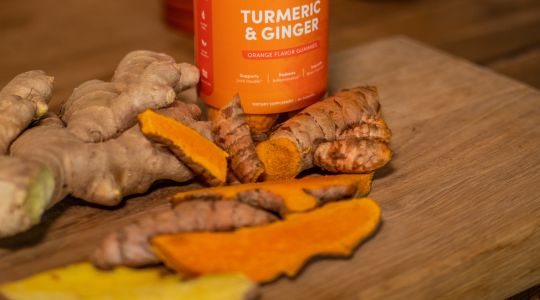
Concussion (or mild traumatic brain injury) is a common injury among youth and adolescents involved in sports (1). Over the past decade, there has been an increase in the literature on the role of nutritional interventions in the treatment of concussion (2), suggesting an increased interest in the role of nutrition in the recovery from this type of injury. Although studies are still very limited, the role of nutrition in concussion recovery is being increasingly observed. This avenue is particularly interesting, as dietary adjustment and supplementation may be much less expensive than some other medical services or may be helpful when some services are limited (2).
Definition and Pathophysiology of Concussion
A concussion can be defined as "an injury to the head caused by a direct or indirect biomechanical force resulting in a reversible clinical syndrome manifested by physical, cognitive, emotional signs and symptoms and sleep disturbances reflecting the predominance of a functional rather than structural injury" (3). The force transmitted to the brain disrupts brain homeostasis by stretching axons, resulting in plasma membrane alteration and a neurometabolic cascade: A massive influx of potassium ions, neuronal depolarization, release of excitatory neurotransmitters and hyperexcitability of nerve cells, change in the concentration of γ-aminobutyric acid (GABA) and glutamate, accumulation of intracellular calcium and sodium ions, leading to damage and death of these cells. This cascade is associated with glucose hypermetabolism, neuroinflammation, decreased synaptic plasticity and changes in cerebral blood flow.
Nutrients That May Have an Impact on Concussion Recovery
Very few studies have been conducted on the neurophysiological impact of nutritional treatment following concussion in humans (2). However, some nutrients have attracted the attention of researchers for their potentially interesting role in the recovery of this pathology.
Branch Chain Amino Acids (BCAAs) and Creatinine
A decrease in BCAA concentration has been observed after concussion in mice (4). An increase in synaptic efficiency and a complete reduction in cognitive dysfunction were observed after BCAA supplementation in mice (2,4) as well as an increase in cognitive function in mice and humans (measured by the Glasgow Scale and the Disability Rating Scale) (4). For creatinine, its supplementation led to a decrease in oxidative stress and a reduction in cellular energy imbalance in rats (2).
Omega-3
Post-concussion omega-3 supplementation in rats reduced axonal and neuronal damage, decreased apoptosis and oxidative stress, promoted cell membrane homeostasis, and protected the integrity of the blood-brain barrier (2). Interestingly, a few case studies of patients with severe concussions have improved with aggressive omega-3 supplementation (approximately 20 g/day) without noted side effects (5).
Magnesium and Zinc
A decrease in brain magnesium concentration was observed within the first hour and up to 5 days with concussion in rats (6). Magnesium supplementation in rats resulted in increased survival of cortical neurons and maintenance of cytoskeletal integrity, whereas pre-concussion magnesium deficiency is associated with greater neuronal loss and increased cytoskeletal degradation (7). Also, it has been observed that pre-concussion magnesium supplementation can prevent intracellular magnesium ion decline post-trauma (8). Unfortunately, the neuroprotective effect of magnesium is not currently observed in humans, with increased mortality observed in clinical studies (9). Zinc has been observed to be both neuroprotective and potentially neurotoxic (10). In humans, increased urinary zinc loss has been observed following concussion (11). Zinc supplementation in humans with concussions has resulted in improved cognition, prealbumin and retinol binding protein (RBP) production, and decreased mortality (12). The results should be interpreted with caution because more patients in the control group required craniotomy, demonstrating the possibility of bias (12).
Fasting, Caloric Restriction, and Ketogenic Diet
A 24-hour fast initiated in rats with head injury resulted in decreased oxidative stress, reduced tissue damage, and decreased cellular imbalance during moderate concussion, although these results were not observed 48 h after concussion or during severe concussion (13). For caloric restriction, an improvement in cognitive dysfunction caused by decreased glial activation, preservation of cell density, and increased autophagic activity was observed in mice (14). For both types of intervention, an improvement in neurometabolic impact was observed in the cortex of mice 30 days post-concussion, with this result also observed in the hypothalamus for intermittent fasting (2). Regarding the ketogenic diet, several studies in rodents have been performed. Although positive results for adolescent rats have been observed (i.e., a reduction in cellular energy imbalance and a decrease in apoptosis markers), discordant results are observed in adult rats (2). A feasibility study on the integration of a ketogenic diet after concussion in humans was also conducted in 2020 and an improvement in visual memory observed after 2 months (15).
Curcumin
Nutrition for Optimal Healing
Additional studies in humans are needed to better identify nutritional interventions that can optimize concussion recovery. However, as in the healing of any other injury, it is important to ensure adequate energy intake, optimal protein intake and avoid nutritional deficiencies (primarily in the key nutrients mentioned above, but also in vitamins and minerals involved in the healing process such as vitamin C) to ensure optimal healing (16). An adjustment of energy intake (according to the change in expenditure, but also the healing process) is also important (16). A TeamNutrition nutritionist will be able to support your clients in these objectives. Click here to make an appointment with one of our nutritionists!
References:
- Gouvernement du Canada. Commotions cérébrales : Activités sportives et récréatives 2019 (En ligne): https://www.canada.ca/fr/sante-publique/services/maladies /commotions-cerebrales-signes-symptomes/activites-sportives-recreatives.html
- McGeown JP, Hume PA, Theadom A et al. Nutritional interventions to improve neurophysiological impairments following traumatic brain injury: A systematic review. J Neurosci Res. 2021 Feb;99(2):573-603.
- Romeu-Mejia R, Giza CC et Goldman JT. Concussion Pathophysiology and Injury Biomechanics. Curr Rev Musculoskelet Med. 2019 Jun;12(2):105-116.
- Cole JT, Mitala CM, Kundu S et al. Dietary branched chain amino acids ameliorate injury-induced cognitive impairment. Proc Natl Acad Sci U S A. 2010 Jan 5;107(1):366-71.2009
- Lewis MD. Concussions, Traumatic Brain Injury, and the Innovative Use of Omega-3s. J Am Coll Nutr. 2016 Jul;35(5):469-475.
- Vink R, Heath DL McIntosh TK. Acute and prolonged alterations in brain free magnesium following fluid percussion-induced brain trauma in rats. J Neurochem. 1996 Jun;66(6):2477-2483.
- Saatman KE, Bareyre MF, Grady MS et al. Acute cytoskeletal alterations and cell death induced by experimental brain injury are attenuated by magnesium treatment and exacerbated by magnesium deficiency. J Neuropathol Exp Neurol. 2001 Feb;60(2):183-194.
- Walrand S, Gaulmin R, Aubin R et al. Nutritional factors in sport-related concussion. Neurochirurgie. 2021 Feb 11;S0028-3770(21)00038-2.
- McConeghy KW, Hatton J, Hughes L et al. A review of neuroprotection pharmacology and therapies in patients with acute traumatic brain injury. CNS Drugs. 2012 Jul 1;26(7):613-636
- Greco T et Prins ML. Traumatic Brain Injury and Diet. J Child Neurol. 2013 Aug;28(8):983-9888.
- McClain CJ, Twyman DL, Ott LG, et al. Serum and urine zinc response in head-injured patients. J Neurosurg. 1986; 64:224–230.
- Young B, Ott L, Kasarskis E, et al. Zinc supplementation is associated with improved neurologic recovery rate and visceral protein levels of patients with severe closed head injury. J Neurotrauma. 1996; 13:25–34.
- Davis, L. M., Pauly, J. R., Readnower, R. D., Rho, J. M., & Sullivan, P. G. (2008). Fasting is neuroprotective following traumatic brain injury. Journal of Neuroscience Research, 86(8), 1812–1822.
- Liu, Y., Wang, R., Zhao, Z., Dong, W., Zhang, X., Chen, X., & Ma, L. (2017). Short-term caloric restriction exerts neuroprotective effects follow- ing mild traumatic brain injury by promoting autophagy and inhibit- ing astrocyte activation. Behavioural Brain Research, 331, 135–142.
- Rippee MA, Chen J et Taylor MK. The Ketogenic Diet in the Treatment of Post-concussion Syndrome-A Feasibility Study.Front Nutr. 2020 Sep 10;7:160.
- Tipton KD. Nutritional Support for Exercise-Induced Injuries. Sports Med. 2015 Nov;45 Suppl 1:S93-104.





